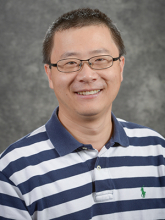EECS Seminar: Revisiting Security in the Age of Software-Defined Everything

Eppright Professor in Engineering
Department of Computer Science and Engineering
Texas A&M University
Abstract: Software is not only eating the world, but also defining the new world. With the increasing examples such as software-defined compute/storage (aka, cloud), software-defined networking, software-defined radio/5G and software-defined vehicle, we are now living in a world of software-defined everything (SDx). Infosys estimated that the global SDx market will reach USD 160 billion by 2024 and grow at a compound annual growth rate of 25%. The security of SDx is becoming more interesting and important. On one hand, SDx presents new attack surfaces and security challenges. On the other hand, SDx also provides new opportunities to rethink the design of security. In this talk, we will revisit the security at both sides and demonstrate with our recent research results. In particular, we show that we can well leverage software-defined principles to enhance zero-trust security and design new programmable security frameworks, thus also making this software-defined world more secure.
Bio: Guofei Gu is a professor and holder of the Eppright Professorship in Engineering in the Department of Computer Science & Engineering at Texas A&M University (TAMU). Before coming to TAMU, he received his Ph.D. degree in computer science from the College of Computing, Georgia Institute of Technology. His research interests are in network and systems security. Gu is a recipient of 2010 NSF CAREER Award, 2013 AFOSR Young Investigator Award, 2010 IEEE S&P Best Student Paper Award, 2015 ICDCS Best Paper Award, 2022 ASIACCS Best Paper Award and Texas A&M Presidential Impact Fellow, among several others. He has pioneered several new research directions such as botnet detection and software-defined network (SDN) security. Gu is an IEEE Fellow and an ACM Distinguished Member. He is currently directing the SUCCESS Lab at TAMU.
Share
Upcoming Events
-
MSE Special Seminar: Designing Sustainable Soft Matter from the Molecule Up
-
EECS Seminar: On-device Contextual AI – Challenges and Opportunities
-
MAE 298 SEMINAR: Control and Estimation of Turbulent Shear Flows using Modal Analysis
-
CBE 298 Seminar: Enabling Inverse Design of Molecules to Drive Defined Physiological Outcomes - A Critical Role for Systems Modeling in a Data-Driven World
-
MSE Special Seminar: Organic Semiconductor-incorporated Perovskites (OSIP) – A New Family of Hybrid
